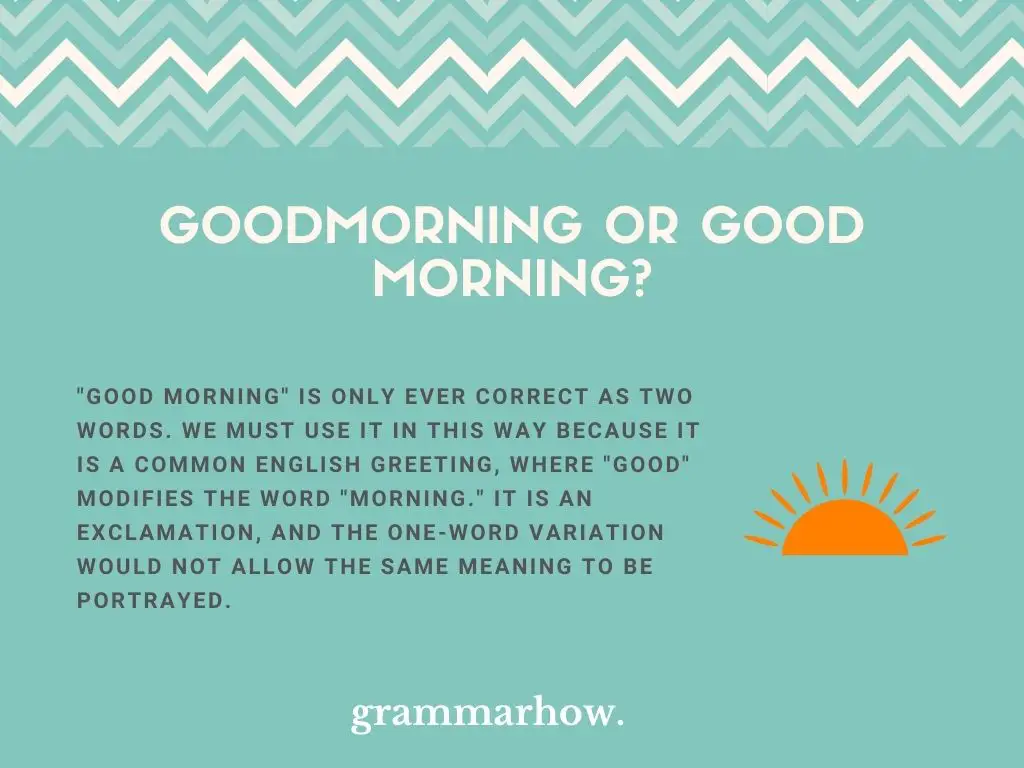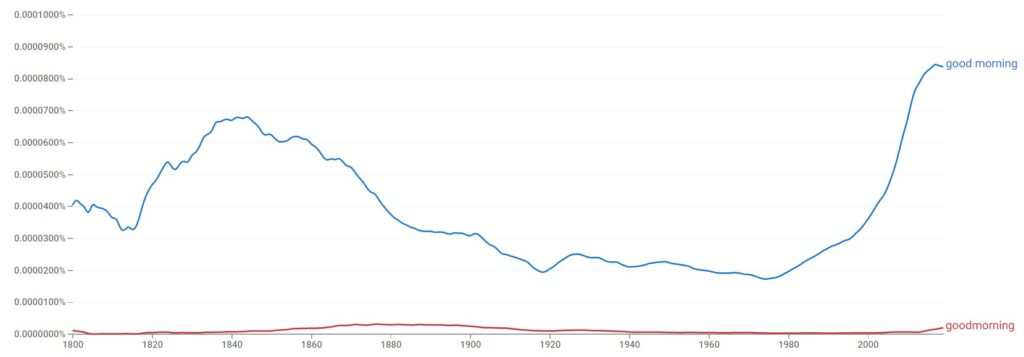“Good morning” is one of the most common greetings in English. Since it’s so common, it would help to know whether it’s one or two words (some people might even write it in the hyphenated form). This article will teach you which form is correct!
Goodmorning vs. Good morning
“Good morning” is only ever correct as two words. We must use it in this way because it is a common English greeting, where “good” modifies the word “morning.” It is an exclamation, and the one-word variation would not allow the same meaning to be portrayed.

According to Google Ngram Viewer, “good morning” is the only acceptable choice of the two variations. From the vast disparity between these trend lines, you can see that the two-word option is the only one you should stick to writing.

In case you need further proof, we can also refer to English dictionaries like The Cambridge Dictionary and The Oxford Dictionary.
Both dictionaries note that “good morning” is two words. It is an exclamation, where “good” modifies “morning” to be friendly and welcoming. Neither dictionary notes “goodmorning” as a suitable form.
Is “Goodmorning” One Word?
We cannot write “goodmorning” as one word if we want to be grammatically correct. The space between the words is necessary to show a clear distinction. It also helps readers break up the sentence’s flow, whereas “goodmorning” would merge into one continual string.
Having a “D” (in “good”) come directly before an “M” (in “morning”) is not a pleasant grammatical construct. Many people would have a hard time distinguishing the intended meaning when reading it.
The problem with removing the space between a phrase like “good morning” also means that people have to create their own space. Since the word “goodmorning” doesn’t look very pleasing, people could create all kinds of strange words, such as:
- Goo dmorning
- Goodmor ning
- Go od morning
Of course, this is a slight exaggeration, but the idea is correct. When reading, your brain can do all kinds of things when trying to distinguish confusing one-word variations like “goodmorning.”
Here are some examples to help you understand more about it:
- Correct: Good morning, kind sir! I hope you’re doing well on this fine day.
- Incorrect: It’s not a particularly goodmorning, but I’m pleased to be here.
- Correct: Okay, it’s not a good morning. At least you showed up to work, though.
- Incorrect: Goodmorning, my fellows! How have you been doing over the last few days?
Is “Good morning” Two Words?
You should write “good morning” as two words whenever you include it in your writing. It’s a common English exclamation, and the two-word separation is a great way for us to convey the meaning without worrying too much about any language rules.
Incidentally, we can also refer to the AP Stylebook when we want to know about one or two-word variations. The AP Stylebook teaches us how hyphens work for compound nouns and adjectives, which in turn applies to one-word variations.
Since “good morning” is neither a noun nor an adjective, there is no reason to follow standard AP Style rules. It cannot be grouped with a hyphen, so we should not treat it in such a way.
Also, one-word variations tend to develop overtime from the hyphenated form. If “good-morning” was correct, then “goodmorning” might one day also be correct. Since the hyphen rules of AP Style do not apply to exclamations, we can ignore both of the other forms.
Here are some correct examples to help you with it:
- Good morning! How are you doing today?
- I hope you’re having a good morning! I know that I am!
- This is a good morning, isn’t it? I really cannot wait to see what today will bring.
- It’s a good morning for a run! I think I might just go out there and have some fun!
Tip To Remember The Difference
We’ve covered all the differences between the variations now. Let’s finish up by giving you a quick tip to remember which is the correct form!
“Good” is a modifier to “morning.” To modify a word with another word, we must always keep them separate. The same would apply if it was a “bad morning.” “Bad” modifies “morning.” Remember, if you’re having a “good” time,” you must write “good morning” as two words.
You may also like: Good Morning [name]: Is There A Comma After “Good Morning”?

Martin holds a Master’s degree in Finance and International Business. He has six years of experience in professional communication with clients, executives, and colleagues. Furthermore, he has teaching experience from Aarhus University. Martin has been featured as an expert in communication and teaching on Forbes and Shopify. Read more about Martin here.
